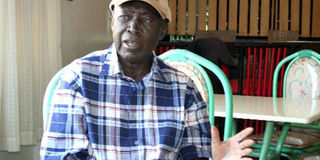Was Prof Ochieng’ an academic gadfly or historian of value? Verdict is yours

The late Professor William Robert Ochieng’. PHOTO/JACOB OWITI | FILE
What you need to know:
- His 1980s column “The Ochieng’ View” in the Sunday Nation, brought out the best of Ochieng’ as a mischievous debater who used his wit to get the public to debate issues.
- In his book, The Moi Presidency in Kenya published in 2007, Ochieng’ recalls he freely advised and even helped write some of Moi’s speeches during his stint at State House. But surprisingly, in the same book, he criticises the Moi regime for intolerance and incarceration of the opposition.
Prof William Robert Ochieng’, who died on December 28, attended Usenge Primary before joining Alliance High School, Kikuyu, between 1959 and 1965.
He obtained an undergraduate degree in 1968 and earned his doctorate from the University of Nairobi in 1971 – the first PhD to be awarded by that university.
As a graduate student, Ochieng’ became a robust contributor who often ruffled feathers at the university with his provocative but thoughtful essays in academic forums.
While there are a handful of public historians in Kenya, Ochieng’s name is perhaps the easiest to remember among students of history because of his forthright engagement in debate at the university and numerous public forums.
His 1980s column “The Ochieng’ View” in the Sunday Nation, brought out the best of Ochieng’ as a mischievous debater who used his wit to get the public to debate issues.
For instance, three years ago, Ochieng’ would confess publicly that he occasionally goaded Prof Ali Mazrui into debate. However, after some time, Mazrui decided to ignore the provocations altogether. Ochieng’ will be missed as a cheeky but among the admirable public historians Kenya has ever produced.
By using the term “public historian”, I mean a professional historian who, besides being knowledgeable about his subject, will attempt to simplify the human past and bring it to life before the public eye for debate in the hope that such knowledge will generate debate to solve burning issues of the day.
Ochieng’ had that knack.
Now that he is gone, who will rub others the wrong way to get them to debate national and regional issues? Who will straighten some of the academic noisemakers, hecklers and cheerleaders and compel them to debate without calling names?
I have often met people who wanted to know whether Ochieng’ was a gadfly or a scholar of nuisance value every time he penned his playful and witty contributions.
He has left behind both fierce critics, detractors and admirers, some of who, even as word went round about his demise, were still debating his bare-knuckle academic ping pong with Prof Taban lo Liyong, a debate that has gone viral on social media.
Most of Ochieng’s contemporaries are still involved in research and teaching in various universities locally and abroad.
They include the likes of Prof Chris Wanjala, lo Liyong, Prof Vincent Khapoya, Prof Henry Mwanzi and Prof Robert Maxon.
These scholars were aware that Ochieng’ relished intellectual debate as a way of ascertaining the truth in the pursuit of knowledge.
That Ochieng’ was a prolific and compelling writer can be gleaned from his scholarly publications over the last four decades. While there are handful other outstanding public intellectuals, he remains perhaps the most controversial among his peers and students alike.
Ochieng’ was principal of Maseno University College in the 1990s before the then President Daniel arap Moi plucked him from academia and appointed him his personal Permanent Secretary.
In his book, The Moi Presidency in Kenya published in 2007, Ochieng’ recalls he freely advised and even helped write some of Moi’s speeches during his stint at State House. But surprisingly, in the same book, he criticises the Moi regime for intolerance and incarceration of the opposition.
He says that during the crackdown of the 1980s, “individuals who were opposed to Moi were arrested and tortured at the underground cells of Nyayo House and forced to confess or else they would be hurriedly jailed or detained.”
He goes on to cite his own experience thus: “I myself got caught up in the mélange of detentions. In 1985, I wrote an article in The East African Standard in which I asked if Kenya’s capitalism had a human face. Moi’s police came for me after midnight and arrested me from my bed at Kenyatta University and took me to the 23rd floor of Nyayo House. This was the grimmest night I ever faced. For two days, I was pestered to state who ‘my masters and subversive colleagues’ were”.
Dr Ochwada is a lecturer in African History in the United States. He was taught History by Prof Ochieng’ at Kenyatta University ([email protected]).




